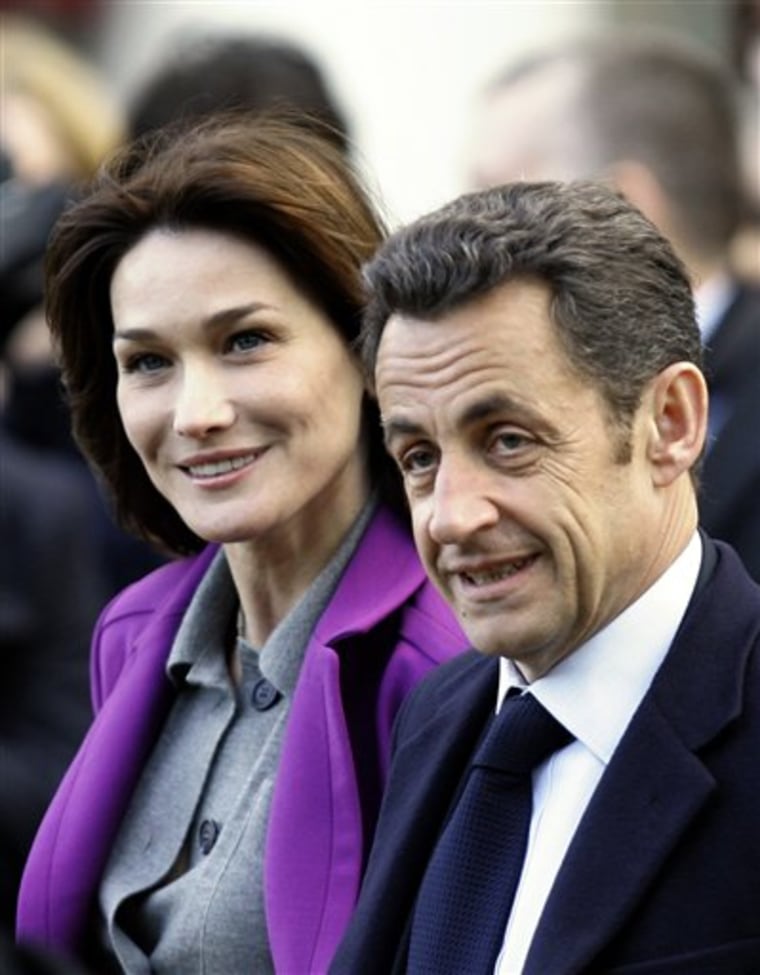France's first lady sings in English and dreams in Italian, and the president's roots reach to Hungary and Greece. Nicolas Sarkozy and Carla Bruni-Sarkozy could be a metaphor for a harmonious, borderless Europe.
The real Europe is a cacophonous and conflicted place, though, as the Sarkozys will soon discover: On Tuesday, they become the continent's public face, as France takes over the presidency of the 27-nation European Union.
It's an unusual, important job, presiding over a bloc that boasts nearly half a billion people and an economy rivaling America's yet that struggles to manage its financial and diplomatic heft.
Impatient and attention-grabbing, Sarkozy will have his hands full trying to guide — and not dictate to — an EU that is trying to prepare the sometimes sluggish continent to meet this century's challenges, from China's growing clout to expanding global demand for shrinking energy resources.
"Sarkozy can sometimes do brilliantly, but can equally be damaging," said Hugo Brady, research fellow at Center for European Reform in Britain. As EU president "you're not supposed to think in terms of national interest ... The presidency needs to lead from the back as a conciliator."
A decision on Tibet
One of Sarkozy's first decisions after France takes the EU helm from small Slovenia will be whether to boycott the opening ceremony of the Beijing Olympics over its treatment of Tibet. The repercussions of a walkout on the EU's relations with emerging economic superpower China could be huge.
Sarkozy inherits an EU facing slowing growth, rising inflation and soaring fuel prices — and mired in doubt about its future after Irish voters rejected a treaty meant to tie the bloc closer together.
The "no" vote was humiliating for Sarkozy, who had touted the treaty last year as France's balm for an ailing EU after French voters helped bury its predecessor, the EU constitution, in 2005.
"Modesty" and "no arrogance" — Sarkozy's aides say these are the watchwords of the French EU presidency. Skeptics question whether the glamorous and wealthy Sarkozys can pull that off.
Olivier Louis of the French Institute for International Relations says Sarkozy's boldness could be an asset, and he could "kick in the anthill" of often-stalled EU decision-making.
But Sarkozy could also be "dangerous, because if it goes over badly, the partners will push back things until the (French) presidency is over."
France's "big country" status within the EU is also a mixed blessing. Germany under Chancellor Angela Merkel deftly used its role as an EU founder and heavyweight to build consensus on global warming and the EU treaty.
But the French "nakedly use the presidency to advance their interests," Brady said.
France has toned down ambitions
France has had to tone down its ambitions in recent months and is focusing on what look like achievable goals: an immigration pact, agreement to cut carbon dioxide emissions by 20 percent by 2020 to fight global warming and renewed efforts to build up EU defense forces.
French diplomats hope Sarkozy stakes out a high EU foreign policy profile while the United States is sidelined with a presidential transition over the next half-year. Sarkozy is likely to maintain pressure on Iran, but any breakthroughs on that front are likely to come from the United States or Tehran — not Paris or Brussels.
EU partners, meanwhile, threw cold water on Sarkozy's ambitious plans for a Mediterranean Union joining nations around the volatile Mediterranean rim. A watered-down union will be inaugurated in Paris on July 13.
The last time France held the EU presidency, in 2000, the bloc had just 15 countries. Back then, as today, the EU was in disagreement over how and how much to integrate and expand.
And back then, as now, France was pushing for a stronger European defense to lessen reliance on U.S. diplomacy and firepower. France recently had to beg European partners — and even Russia — for helicopters for the French-dominated EU peacekeeping force protecting refugees from Sudan's Darfur region.
Six months isn't a long time in terms of EU bureaucracy, and analysts note few countries make great strides during their half-year terms in charge. Sarkozy may hope to be an exception — after all, he met, courted and married supermodel-turned-singer Carla Bruni in a whirlwind three months.
